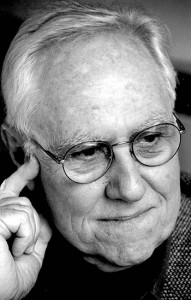Samuel C. Florman
Appearance

Samuel C. Florman (born January 19, 1925 – February 3, 2024) is an American civil engineer, general contractor and author. He is the chairman of Kreisler Borg Florman General Construction Company. He has published six books and over 250 articles and has written numerous reviews for The New York Times Book Review.
Quotes
[edit]The Existential Pleasures of Engineering (1976)
[edit]- Since the lot of the common man had traditionally been one of unrelenting hardship, engineers looked upon their works as man’s “redeemer from despairing drudgery and burdensome labor.” Once the common man was released from drudgery, the engineers reasoned, he would inevitably become educated, cultured and ennobled. ... Next, elevation of the common man would tend to make all men more nearly equal, thus making the engineer an agent in the realization of the democratic dream, “an apostle of democracy,” as one engineer orator put it in 1905. ... “We are the priests of a new epoch,” an engineering leader told his colleagues in 1895, “without superstitions.”
- pp. 6-7
- The most marvelous engineering feats have been performed each day, even more marvelous than they sometimes appear to our rather jaded sense of wonder. But how is it possible to appreciate these achievements when the very foundations of the profession are being attacked and appear to be crumbling? ... The profession, for all its continuing technical achievements, finds itself at the present time in a Dark Age of the spirit.
- p. 11
- Sanctimonious slogans have a way of lulling well-meaning people, and at the same time providing self-seekers with means to frustrate the very controls that are most needed. Take, for example, a report entitled, “The Engineer’s Responsibility in Environmental Pollution Control,” submitted in 1971 to the government’s Council of Environmental Quality by the National Industrial Pollution Control Council. The report is an amorphous collection of noble generalities. It conjures up a vision of a crusading army of engineers, thousands abreast, marching in unison. The banner of this army is “cooperation.” Its mission is to “coordinate,” “unify,” “interact,” “centralize efforts,” and “pool resources.” Its weapons are “shared objectives,” “common goals,” “interdisciplinary concepts and techniques.” The cloud of pieties serves, not to enlighten, but to obscure the real truth, which is that environmental pollution control can never be achieved by the worthy sentiments of industr8ial spokesmen, but only by government regulation.
- p. 27

